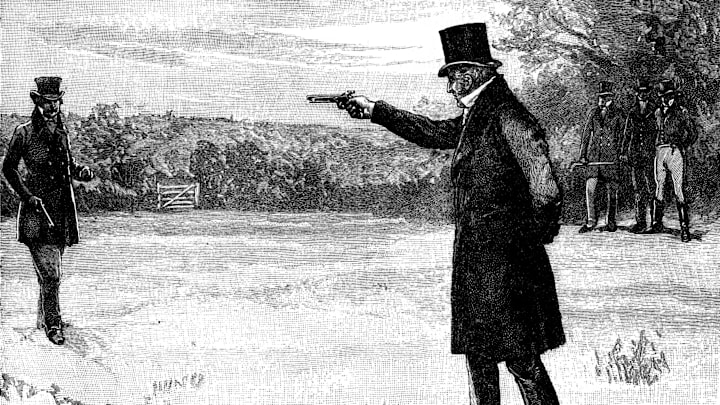In January 2024, a member of the Missouri state senate proposed a motion that, if passed, would reintroduce dueling as a means for politicians to resolve personal disputes. In an amendment shared on X, Republican Nick Schroer longed to return to a bygone time when, “if a senator’s honor is impugned by another senator to the point that it is beyond repair […] such senator may rectify the perceived insult to the senator’s honor by challenging the offending senator to a duel.”
If it’s approved, the amendment would add a new chapter to the long and bloody history of political dueling in America.
Dueling dates back to medieval Europe, when knights and noblemen could challenge one another to a fight and resolve their conflicts physically rather than verbally. Initially, duelers wielded swords and other hand-propelled melee weapons, but soon switched to guns, turning the practice from a Game of Thrones-style trial by combat into a stalemate with no clear winner or loser. Though seen as barbaric today, dueling originally came about as a way to minimize casualties, its outcome determined not solely by the skills of the duelers, but the grace of God as well.
When European settlers colonized North America, their dueling customs followed suit. The most famous political duel in U.S. history was between Vice President Aaron Burr and Secretary of the Treasury Alexander Hamilton. Immortalized in Lin-Manuel Miranda’s prize-winning musical, the duel was the culmination of a lifelong rivalry between the statesmen and their seemingly irreconcilable ideologies. When Burr challenged Hamilton to a duel in 1804 over the latter’s defamatory letter (Hamilton had called Burr a “profligate, a voluptuary in the extreme”), the Federalist was shot in the abdomen and died the following day.
Because refusing to duel was considered even more humiliating than the insults that sparked them, most men did not think twice about risking their lives for a chance to emerge victorious. A rare exception took place in 1842, when a young Abraham Lincoln apologized for referring to Democratic State Auditor James Shields as a “smelly, foolish liar” in a newspaper editorial. Had Lincoln taken up a firearm, he might have died before ever becoming president.
In the years leading up to the Civil War, many U.S. political duels were fought over disputes concerning the future of slavery. An 1859 duel between abolitionist U.S. Senator David C. Broderick and David S. Terry, a pro-slavery former chief justice of the California Supreme Court, is often called “the last notable American duel.” It ended with Broderick shot in the chest after a misfire. Broderick passed away from his wound three days later, his public funeral in San Francisco attracting thousands of spectators.
Dueling was already falling out of fashion by that time, with more than 18 states outlawing the practice by 1859. The public's appetite for dueling was further quelled by the bloodshed of the Civil War. If Missouri’s Senator Schroer has his way, though, the medieval tradition might resurface once more.
